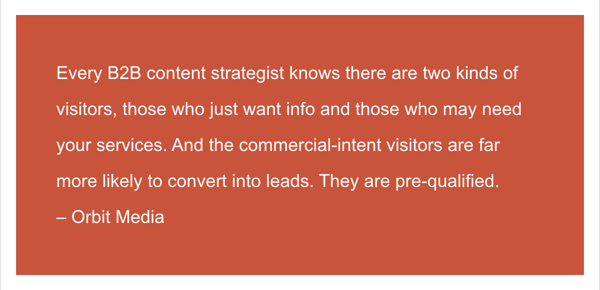
A lot of businesses think that content marketing goes something like this: you write a bunch of articles, post them to your blog, share them in social, and magically see new leads come pouring in. What happens is quite different.
The link between content creation and lead generation isn’t quite so straightforward or formulaic. Lately, I have noticed that some of my peers are starting to ask questions about this as well. In fact, I recently came across insights by the always-insightful Andy Crestodina at Orbit Media in Chicago.
Andy’s observation is that most blog traffic doesn’t convert directly into business opportunities.
By looking at user behaviour, he has shown that only a small handful of readers will move straight to a service page. His conclusion, then, is that most blog visitors and content consumers don’t have “commercial intent.” In a nutshell, they aren’t buyers. And I agree.

With that in mind, he suggests the real value of content marketing lies in the links each new page can provide to other parts of your website, thus improving your domain authority.
I like and respect Andy a great deal, and agree there's value in that, but I’ve come to a slightly different conclusion.
In this post, I’d like to show why a different perspective matters.
It’s my view that most marketers are looking at blogs and content marketing through the wrong lens, causing them to miss out on important lead generation opportunities from "researcher" type visitors. These people routinely convert on download offers. I believe them to be the front line who can influence those with commercial intent.
Before I get into our perspectives, I’d like to begin by pointing out that Andy and I agree on almost every critical point, and that I’ve often been inspired by his examples. We both see content marketing as a valuable tool for branding, lead generation, search engine optimization, and building thought leadership. Neither of us is going to tell you to stop producing quality articles and promoting them.
To be more specific, I also happen to agree with his point about domain authority and search. The more high-quality content you have on your website, the easier it is to improve your Google ranking - because great content attracts interested people.
As beneficial as it can be to keep improving your search visibility with fresh content, I think many marketers largely overlook the value of “non-commercial” visitors. Over the long run, I consider them to be critical to the thrust of a winning content marketing strategy.
To see how I arrived at this conclusion, I invite you to re-think your content strategy beginning with exploring just who is reading your content.
It’s certainly the case that most of the visitors who arrive at your blog aren’t going to have an immediate need for what you have to offer. And, many who do won’t have the authority, budget, or immediate motivation to make a decision. In that sense, it’s true that you aren’t going to get a lot of immediate and direct conversions along the expected “blog reader to qualified lead” funnel.
However, that’s not the way most business referrals and relationships work. If you sell a complex B2B service, for example, you wouldn’t normally expect to call a buyer, have them hear about your business, and make an immediate decision to sit down with you. It’s nice when that happens, but it doesn’t occur very often at all.
That’s why we develop buyer personas that include influencers. These are the men and women who gather information on potential vendors and solutions, and screen the options for their decision-makers. They may also pass along your name and materials, provide online or in-person introductions, or may even publicly promote your ideas. It’s pretty sweet when that happens. These are the researchers who transform into advocates.
These people might not turn into leads as quickly, or in as high of percentages, but they don’t have to – they literally outnumber the buyers by a factor of more than a hundred.
What they will do, if you delight, impress, and move them, is hang on to your information, share and promote your content, and otherwise build your credibility and search rankings without any active effort on your part. And that's a beautiful thing by any standard!
When you realize the power that influencers have in the lead generation process, a few things come to light:
Rather than trying to turn readers into buyers, you simply share information, insights, and perspectives. It's a world of abundance over scarcity.
At Kayak, we focus on helping others before seeking to benefit from them. That’s because we know that when we have the right relationships in place, business opportunities naturally follow.
I suspect Andy would agree with me here. I’m positive he and the Orbiteers (I love that name!) benefit from the same viewer/researcher dynamics that we and our clients do. After all, why else would he go to such effort generating so many smart and insightful articles that benefit viewers far from his immediate client base?
When you become known as a reliable expert in your field, and an idea generator that shares valuable perspectives rather than sales messages, your reach can grow very quickly.
You find a lot more readers and viewers for everything you produce, and the resulting engagement helps you to stand out in an otherwise crowded content marketing landscape.
As I’ve mentioned, there is a lot in traditional content marketing advice (and especially Andy’s well thought out piece) that I agree with. Still, I took his ideas as a chance to share another perspective.
Here at Kayak, we certainly work on keyword optimization, sales funnels, and internal links for search engine optimization purposes. When it comes to the focus of our blog posts and content marketing efforts, though, our primary goal is to share ideas and grow our network.
"...decision making is emotional and every decision we have to make is distilled by the twin filters of uncertainty and fear." – David Amerland from (Data, Empathy and Decision Making)
Coming from that perspective, we have an opportunity to appeal to those commercially-minded website visitors, without missing the dozens or hundreds of other people that have influence over them. The answer, if needed, is to simply share without expectation. What a wonderful way to help others and earn trust in the process.
Do you agree or disagree? Do you find our approach to content marketing to be softer than you are used to? Don't be shy...let us know what you think!